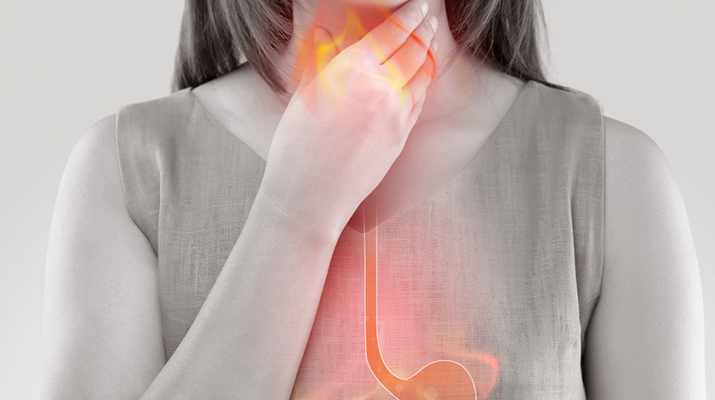Dietary changes and even surgery are indicated to treat this condition — also known as the ‘silent reflux’
By Deborah Jeanne Sergeant
Gastroesophageal reflux disease (GERD) causes the acid and food in the stomach to go back into the esophagus. The happens when the lower esophageal sphincter opens when it shouldn’t. Patients suffer pain, sore throat and heartburn severe enough that the sensation even reaches the mouth.
Patients presenting with chest pain should first rule out heart issues.
Atypical heartburn, called “silent reflux,” can cause sinusitis, cough, and chest discomfort, not the typical heartburn. Beyond the uncomfortable symptoms, ongoing exposure to acid can cause lasting damage and even cancer.
Endoscopy can lead to a diagnosis and then treatment options.
For people who have a high acid load, medication can help control it. Lower potency acid reducers are available over-the-counter and higher potency by prescription. Proton pump inhibitors are another type of medication prescribed to hamper the final step of acid production in the stomach.
Long term side effects from that medication can include decreased calcium absorption, diarrhea, abdominal pain and headache.
Other interventions can help.
Kelly Springer, a registered dietitian and owner of Kelly’s Choice, LLC in Skaneateles, encourages patients to try dietary adjustments for relief.
“We get referrals from gastroenterologists,” she said. “We can help people with acid reflux and GI disorders.”
She listed foods to limit, including acidic items like citrus, tomatoes and sauce, and coffee. Spicy foods like hot peppers and sauces can also irritate the system. High fat foods like fried foods, many kinds of nuts, nut butters, added fats and fatty meats can also prove bothersome, as can mint, garlic, and onions, caffeine, carbonated beverages, wine and sometimes other types of alcohol.
In addition to dietary changes, Springer advises patients with GERD to make lifestyle changes.
“With acid reflux, a lot of times it’s overeating which causes acid to push up,” she said. “That can cause a lot of acid to build. They also could be making a little more acid. Eating smaller meals throughout the day, they tend to have less acid reflux.”
Overweight people may find relief from losing weight, as carrying too much weight can worsen GERD. Wearing looser clothing and quitting smoking can also help reduce the effects.
Springer wants patients to wait three hours after eating before lying down. She also said that raising the head of the bed nine inches can keep acid where it belongs.
To generally improve digestion, she wants people to eat more probiotic foods, including kimchi, kombucha, yogurt, kefir, and fermented pickles and other vegetables.
“I do think that a lot of it has to do with food choices,” Springer said. “If we had more fiber in our diets and more probiotics, we’d have less GI issues, including acid reflux. Get back to real food eaten consistently throughout the day. Some people with acid reflux skip meals throughout the day and the overeat at the next mealtime. Eat regularly scheduled meals with real food. Then these symptoms diminish.”
Karen Fisk, wellness educator at Natur-Tyme in Syracuse, helps patients look into digestion for possible contributors to their GERD.
She said it stems from an imbalance of digestive juices, beginning with sensors in the tongue that tell the pancreas the makeup of the food eaten.
“By the time you swallow, the stomach increases the hydrochloric acid to set the stage for digestion and the pancreas has released the enzymes,” Fisk said.
She said that anyone lacking enzymes can’t properly digest the food and it ferments, causing gas. That gas pushes the bile up, causing reflux.
“Select foods you digest well and take digestive enzymes that do what pancreatic enzymes would do,” Fisk said. “You should have some relief and be able to minimize the excess acid because the body won’t generate what isn’t needed.”

